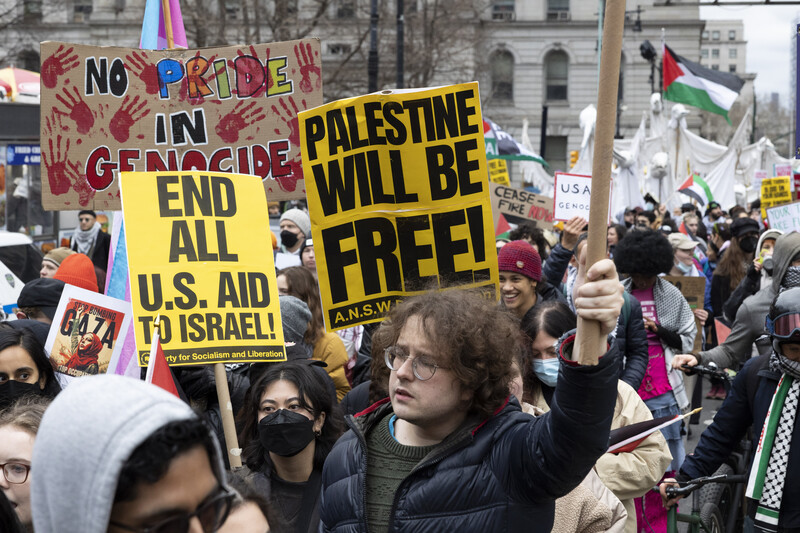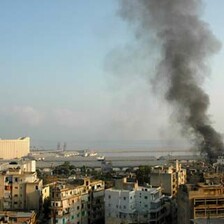The Electronic Intifada 23 April 2024

Protesters on Brooklyn Bridge in New York in January.
ZUMA Press WireIn November 2023, while analyzing the mainstream news immediately after the 7 October Palestinian breakout from Gaza and defeat of the Israeli Gaza command, legal scholar Noura Erakat noted that there was “a discourse on day one that understood Oct. 7 as a prison break or the Tet Offensive; people were distressed, but there was an understanding of the logic.”
This, however, soon shifted, as a counter narrative established a “framework that subsumed Hamas squarely within the War on Terror and Islamophobia and synonymized Hamas with ISIS.”
And it has been clear that since the first day, Western liberal commentators, labor unions, and so on, have largely made sure to “condemn Hamas” before calling for a ceasefire, what The Electronic Intifada’s Ali Abunimah has called a “kind of condemnation olympics.”
Others have attempted to sidestep Palestine altogether, such as during the late-2023 and early-2024 US Congressional funding debates over a proposed combination of fascistic US border policies with weapons funding for Israeli, Ukrainian and Taiwanese “defense.”
Alongside more prominent examples, a little-noticed letter from over 130 immigration advocacy groups went so far as to insist that the immigration “measures be stripped from the legislation or, should they remain, that Congress reject this bill,” while making no mention of the genocidal overseas weapons provisions.
At best the statement implies: Let us put aside the key portions in this bill that fund the ongoing genocide of Palestinians and other military escalations; the immigration provisions are more important.
The signatories could have rallied around the opportunity to point out connections between US-domestic border imperialism and the occupation and oppression of Palestinians. Within a broader shared project of European settler-colonialism and imperialism, examples of such connections include police/military training and technology exchanges and the indefinite “administrative detention” of the colonized and displaced as a tool of discipline and deterrence.
But the NGO complex enforces siloed, single-issue focus, undermining solidarity across intersecting movements, and generally compels avoidance of work on the imperialism and (neo)colonialism at the root of peoples’ oppression and displacement.
Liberal silence
While some of the signatory organizations have offered other signals of solidarity with Palestine, many appear to have avoided any such public discussion, presumably over fear of backlash from Zionists or a desire to “stay in our lane,” both common within self-styled “movement” nonprofits.
The US, meanwhile, has continued to provide weapons to the Israeli occupation and separately confirmed unprecedented billions in funding for US border enforcement and immigration incarceration systems based on a lethal and torturous deterrence policy, as Biden considers how to play to the right on other immigration measures.
Enforcing both liberal silence and the ahistorical “both sides” stance common to many on the Western “left”, post-7 October mainstream Western media coverage has relentlessly repeated propaganda framing the resistance operation as an unprecedented mass atrocity.
Many Palestinian analysts have pointed out this precise effect.
“[W]hen Palestinians dare to rebel and challenge their imposed fate after years of oppression, the responses are predictably schizophrenic,” Abdaljawad Omar wrote in November.
“The same intellectuals who once sobbed at our plight are now torn. Many become moral policemen, quickly brandishing the baton of condemnation, but even more importantly, readily ‘adopting’ with full intensity Israel’s curated and sensationalized version of the events of October 7 in the so-called Gaza envelope [the Israeli settlements bordering Gaza].”
Apparently designed to absolve themselves before liberal audiences of seeming to endorse violence, these sorts of condemnations ignore the long history of anti-colonial struggles, including Palestine’s, which have required the use of armed resistance in order to break free from the structural violence of colonization.
Understand don’t opine
Public intellectuals like Steven Salaita, ousted from US academia for speaking steadfastly for Palestine, offer an alternative example in which one preserves both moral integrity and intellectual clarity by refusing to be disciplined into silence or obfuscation. His reflections on becoming a school bus driver and eventually landing a university teaching job in Cairo provide valuable clarity against liberal opportunism and cowardice.
His 2018 “A guide to principled anti-Zionism” remains an important read.
The Global North’s political economy relies on the oppression of the Global South in general and of Palestine in particular.
As academic and writer Patrick Higgins noted in late October: “We’re seeing a blow against the US-led world system. Since, really post-World War II, but especially post-1970 or so, Israel has been the linchpin, the basket into which most of the American chips are put, in order to sustain broader control of West Asia.”
This historical reality places a profound obligation on those in the Global North who would seek to be in solidarity to seriously consider what strategies and tactics Palestinians are calling for in the struggle for liberation, sovereignty and safety.
Such calls to action do not include that we opine on Palestinians’ methods of resistance.
They do include that we understand the history and actuality of that resistance, do all we can to stop the ongoing provision of arms to the occupation, engage in boycott, divestment and sanctions, and fight back against the criminalization of those who support Palestine’s liberation from Zionist settler colonialism.
As Virginia Tech’s Bikrum Gill exhorted: “Show no fear, no surrender, as you oppose those who support the US-Israeli genocide of Palestinians. Bring your institutions to crisis if their functioning requires silence or complicity.”
PJ Podesta is based in Huchiun, occupied Lisjan Ohlone land. He works on anti-carceral campaigns with people displaced by US imperialism and is a member of Law Lab United.


Comments
Essential reading
Permalink NN replied on
Here is a good read, especially to share with newcomers, about how Israel became a so-called "peace-loving" member state of the UN ... and never fulfilled its obligations.
Shahd Hammouri
A Forgotten Detail: The Right of Return was a Condition of the Establishment of the State of Israel
Opinio Juris, 11 March 2024
https://opiniojuris.org/2024/0...